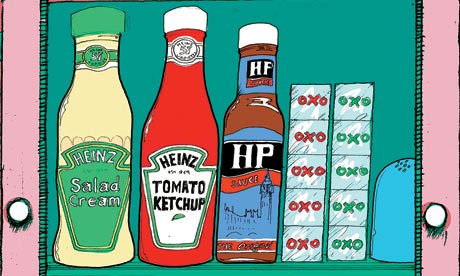
'You are anal retentive," reads a possibly apocryphal T-shirt, "if you wonder whether there should be a hyphen in 'anal retentive'." As methods of psychiatric diagnosis go, this isn't great – but then again, "anal retentiveness" is itself a bogus notion. Few ideas of Freud's stand more discredited than his claim about the importance of bowel control in the formation of personality. It arose in an era when families were large and indoor plumbing was new, argues the psychoanalyst Robert Galatzer-Levy: bowel-related matters probably did figure centrally in the life of young Sigmund, as he waited for his siblings to finish in the bathroom. Critics of Freud have suggested that he often constructed his supposedly universal theories on similarly shaky ground, but I think we all know they're just suffering from repressed attraction to their mothers.
One sad legacy of "anal retentiveness" is that it has cast suspicion on the simple pleasures of being a neat freak. Speaking as a person who enjoys arranging my groceries on the supermarket belt so as to use the space in an optimal fashion, I've been thrilled to witness the recent awakening of neat pride. I'm thinking, above all, of the blog Things Organized Neatly, although the image-sharing service Pinterest has also become a hub for neatniks, who post photos of tidily arranged things on "pinboards" that are themselves neatly organised. And you can imagine my delight on learning that 2012 is the 25th anniversary – a pleasing number, better than 24 or 26 – of the invention of the word "knolling", defined as "the process of arranging like objects in parallel or 90-degree angles as a method of organisation". It emerged from the workshop of Frank Gehry, who was then making furniture for Knoll and whose staff knolled his studio regularly. I've been a knoller all this time without knowing it.
It's important to distinguish neat-freakery from obsessive-compulsive disorder: what makes OCD a disorder is that the sufferer doesn't enjoy their rituals, that they get in the way. True, pleasure-in-neatness can also be taken too far, bordering at its extremes on something more sinister. Somehow, it's unsurprising to learn that Melvil Dewey, the library categoriser who changed his name from "Melville" because the excess letters bothered him, was also racist: he loved orderly dividing lines of the bigoted variety, too. We more moderate neatniks, psychologists suggest, are driven by a desire to assuage anxiety and feel in control, but so what? The fact that a behaviour has a hidden cause doesn't automatically mean it's bad.
Relationship advice forums, online and off, heave with complaints from neatness lovers about living with "slobs", though less of the reverse, since untidy types don't tend to find tidiness galling in itself. The only viable solution the experts offer is "zoning": demarcating areas where messiness or tidiness rules. You can't eliminate your partner's disorganised ways, but you can organise the disorganisation. So you still win. And what's true love about, if not sneaky point-scoring like that?
• The Antidote: Happiness For People Who Can't Stand Positive Thinking, by Oliver Burkeman, is published by Canongate at £15. To order a copy for £12, including mainland UK p&p, go to guardianbookshop.co.uk
oliver.burkeman@theguardian.com
Follow Oliver on Twitter.

